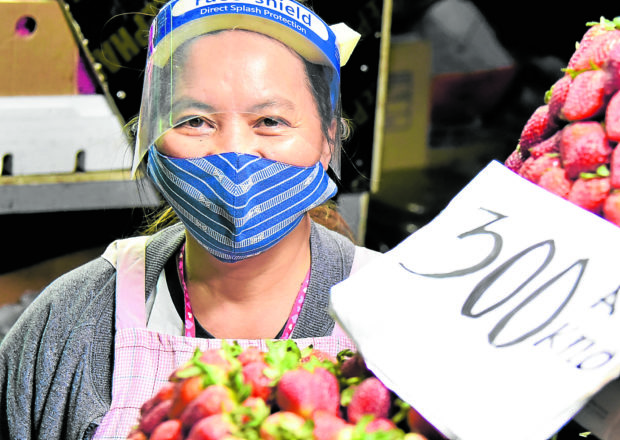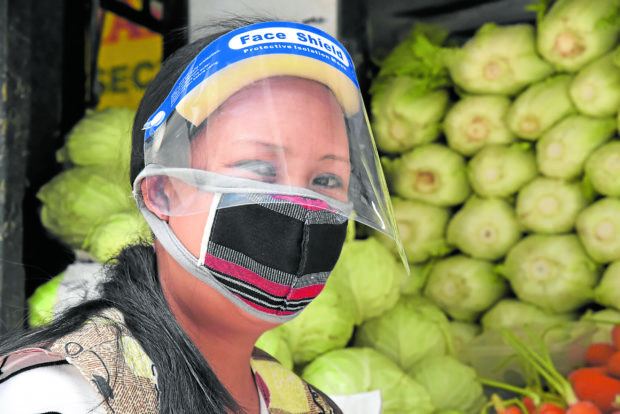Masks reveal history of Cordillera fabrics
BAGUIO CITY, Benguet, Philippines — A small tailoring shop at the back of City Hall has been selling cloth masks for P30 each since the start of the Luzon quarantine in March.
Medical masks, which can prevent transmission of the coronavirus, cost up to P28 apiece but can only be used for hours, so cheaper cloth masks have become the norm.
But the growing need for face masks has reopened an interest in Cordillera fabric that now benefits weavers from Ifugao, Benguet, Mountain Province and Abra.
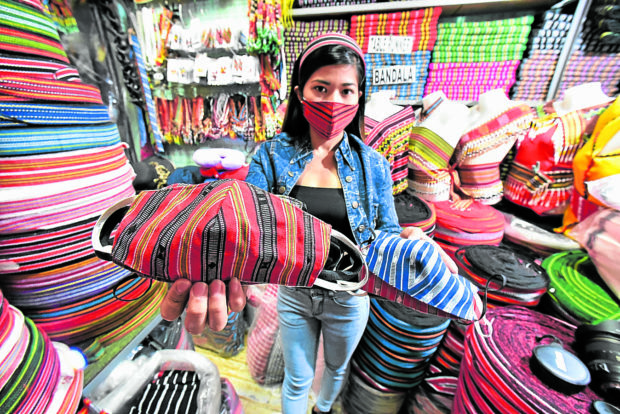
** for Mask feature t0619luz4 ** JUNE 23, 2020 Masks made of Cordillera weaving fabrics are sold in most souvenir shops at the Maharlika Livelihood Center’s old Marbay district in Baguio City now that these devices have become necessities during the pandemic. PHOTO BY EV ESPIRITU
Indigenous fabric
Masks made of indigenous fabric have retained some level of value both for producers and their clientele. This is because of the time, effort and history behind the fabric woven the traditional way in many parts of the city and other Cordillera towns.
Weavers of handicrafts retailer “Narda’s” have also embarked on producing indigenous masks, which are sold for more than P100 apiece.
The additional clothing line was born out of the financial crisis that left Narda’s a struggling business, said its manager, Lucia Capuyan-Catanes.
Speaking from Canada where she was stranded when the country imposed the quarantine, Catanes, daughter of the late Igorot weaver, Narda Capuyan, said mask making became a fallback operation.
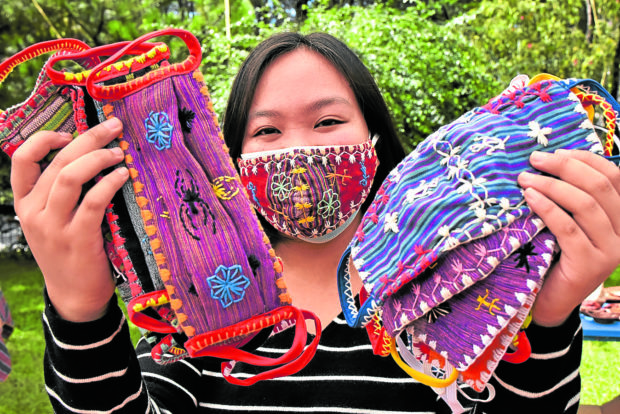
ABRA CREATION Face masks featuring Itneg designs from Abra province are among the items available at an artisan’s bazaar at the University of the Philippines Baguio.
Earning a little
“Umaray na ang bulsa (The lockdown hurt our pockets) so we needed to make face masks so our weavers could earn a little,” said Catanes, who also serves as manager for design research and development of her mother’s company, Narda’s Handwoven Arts & Crafts.
Though unproductive from March to May, the shop maintained the salaries of 60 weavers, tailors and store employees. Instead of remaining idle, the staff produced 2,000 pieces of personal protective equipment (PPE) for Baguio hospital workers using fabrics donated by other people.
As the lockdown eased and businesses were allowed to resume in May, Narda’s had been earning from specialty PPE and ikat (weaving style where fabric is dyed) masks, Catanes said.
“Our weavers completed 600 ikat face masks and were producing more when sales spiked online because of interest over social media,” she said.
“Orders have streamed not just in Baguio but from other areas like Metro Manila and we are now developing an efficient delivery system during the quarantine,” Catanes added.
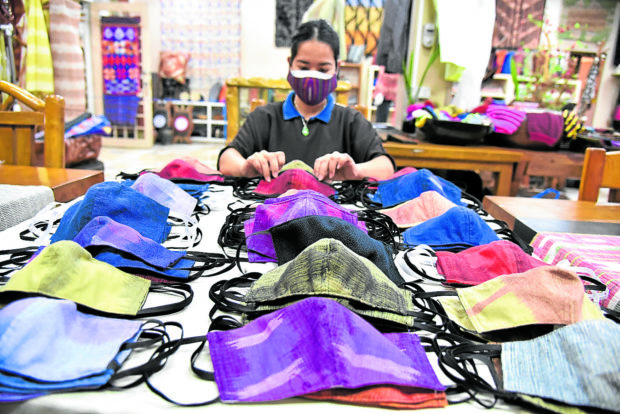
IGOROT BRAND The popular fashion line Narda’s produces masks that tie together Cordillera culture and the brand recognition that drew international spotlight on the region’s traditional weaving and fabrics.
High demand
Store sales also recorded a high demand for masks when Narda’s Baguio outlet opened after the city transitioned into modified general community quarantine on June 1.
Catanes said each mask was made with great care “and commitment to public health safety.”
A Narda’s mask is made up of three layers—the handwoven ikat on the outside, a cotton lining for the middle filling and a Tetoron polyster layer.
Some of the tailors sewed in little pockets in a special line of the mask where the wearer can install filters.
Cordillera culture
The cheapest mask at Narda’s sells for P98 while the more expensive line is sold at P135.
Masks have never been part of Cordillera culture although traditional weaving has been used even before the 1800s to create skirts, G-strings and blankets.
The rich history is evident in the intricate patterns of indigenous fabric that now adorn some masks sold in the market.
The indigenous fabric caught international attention in the 1970s and 1980s, initially due to souvenir shops frequented by tourists before exporters found a niche market for home furnishing and fashion apparel made by artisans.
Other seamstresses and weavers have sold masks made from home but have made better sales online instead of at local shops, like Isabel Dumangeng’s “Tribu Sabsabali” at Maharlika Shopping Center.
Stores are coping with low sales because residents are still required to stay at home unless they have to work, or buy food during their designated market days.
But Cordillera masks may be a boom cottage trade in the near future, Dumangeng said.
“I was able to complete my schooling because of backstrap weaving and this is how I make my living,” she said.
The masks are also a way to repurpose some of the unsold fabrics to help people cope with the pandemic, Dumangeng said. Her five tailors produce 250 masks a day. Each mask sells for P70 to P85.
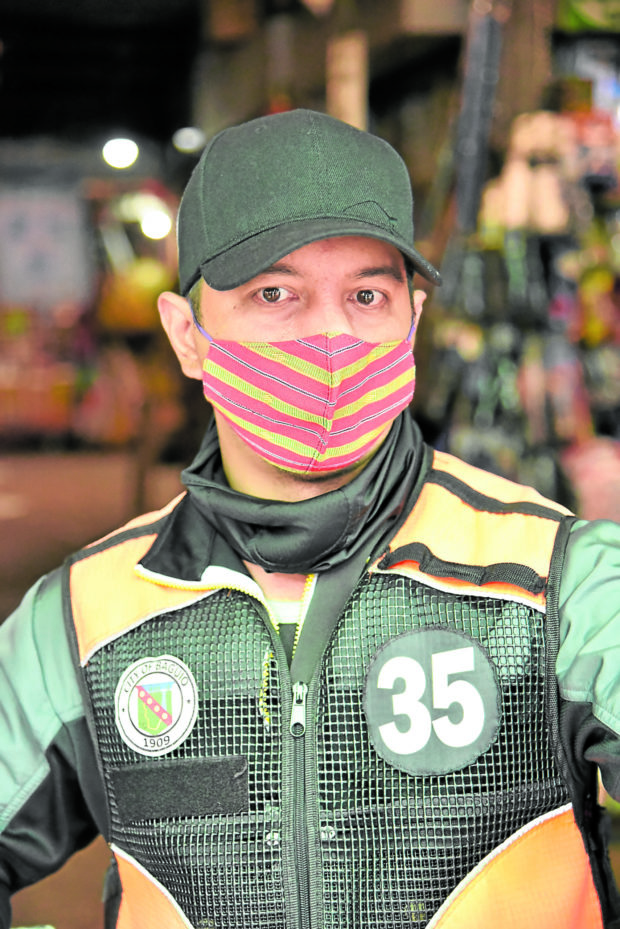
CULTURAL IDENTITY For many Cordillerans, wearing masks featuring patterns and designs from their indigenous groups reflects their pride in their rich culture.
Artisan’s market
The masks were on display at an artisan’s market put up by the University of the Philippines (UP) Baguio every Monday and Tuesday until next month to help displaced weavers recover from the lockdown.
It became a venue for traditional weavers of Peñarrubia town in Abra province who were unable to sell their wares, said UP Baguio anthropology professor, Analyn Salvador-Amores.
In Mountain Province, 31 women from the Guinzadan Weavers Association have been producing face masks made of colorful handwoven inabe, or abe (local term for Ilocano cloth inabel), prints since March. Guinzadan is a village in Bauko town, which is known for backstrap weaving.
Main livelihood
“This is our main livelihood these days since there are only a few buyers of our usual products like bags and dresses,” said Cadwising Dalisan, a 26-year-old weaver and seamstress.
The group uses inabe as the main material combined with a thin lining of commercial fabric.
“Some customers request for a filter pocket so they can insert filters into the mask for added protection,” Dalisan said, adding that their face masks are mostly sold online where they get customers from Metro Manila.
The group also supplies stores in Mountain Province and nearby areas in Benguet and Ilocos Sur.
Dalisan said the group recently received sewing machines and looms under the shared services facility program of the Department of Trade and Industry. —WITH A REPORT FROM EV ESPIRIT
For more news about the novel coronavirus click here.
What you need to know about Coronavirus.
For more information on COVID-19, call the DOH Hotline: (02) 86517800 local 1149/1150.
The Inquirer Foundation supports our healthcare frontliners and is still accepting cash donations to be deposited at Banco de Oro (BDO) current account #007960018860 or donate through PayMaya using this link.
